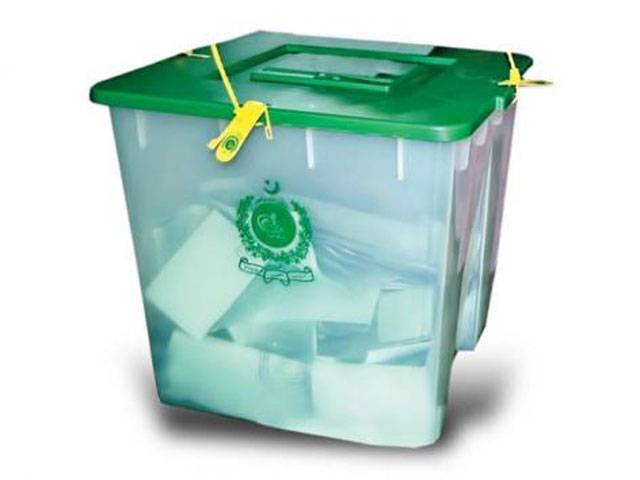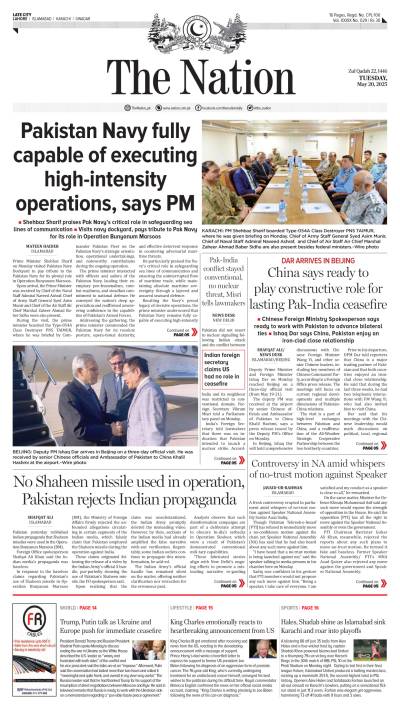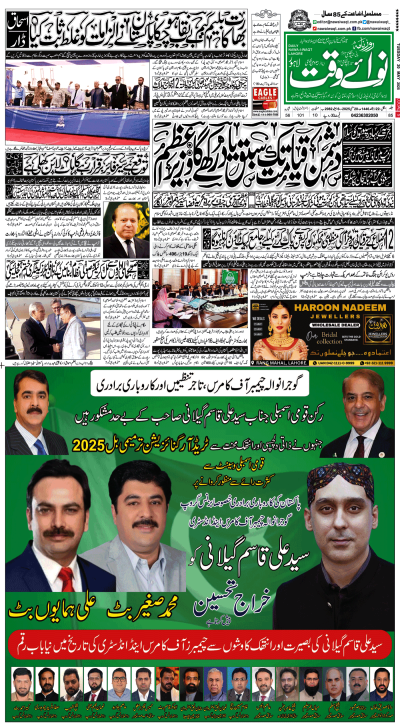ISLAMABAD - Emerging extremist organizations in Pakistan are operating alongside existing political groups and trying to change the election scene to implement their OWN agendas. With elections getting closer, there is, however, no time left for ambiguity about who has the power to influence the political landscape, and who does not.
Their impact is best reflected in the manner in which state institutions perceive and treat them. It is a an open secret now that criminal proceedings against members of these organizations are extremely slow and inefficient, and politicians avoid openly condemning them; some of them collaborate with extreme right organizations on the local level.
According to a detailed survey conducted by The Nation, banned organizations' more than 70 candidates from the Punjab, belonging to different sectarian groups, are contesting the general elections despite the fact that intelligence agencies had warned the ECP that some of them have allegedly involved in helping sectarian clashes.
According to the list of the sectarian elements running for the coming elections, belong to the defunct Sipah-e-Sahaba Pakistan (SSP), which has already been renamed as Ahle Sunnat Wal Jamaat (ASWJ), led by Maulana Mohammad Ahmed Ludhianvi. ASWJ did not register itself with the ECP it has fielded candidates on Muttahida Deeni Mahaz (MDM/United Religious Front) platform. Currently the defunct SSP activists have been allowed to contest elections on a high court order while proceedings of the case are under process. Candidates belonging to Jamiat Ulema-e-Islam (Fazl), Tehrik-e-Jafria Pakistan (TJP) and Jamaat-e-Islami Pakistan (JI), Jamiat Ahle Hadith (JAH) and defunct Harkatul Mujahideen (HuM), Majlis-e-Wahdat-e-Muslimeen (MWM) and the Sipah-e-Mohammad Pakistan (SMP) are also particiapting as independent and other new registered parties name.
Most of the candidates are contesting the elections from Punjab districts including Muzaffargarh, Jhang, Faisalabad, and Rawalpindi districts, Jhelum and Rajanpur, Bahawalpur, Chiniot district, Sheikhupura, Khanewal and Dera Ghazi Khan districts while Lahore, Sialkot, Attock, Sargodha, Toba Tek Singh, Bhakkar, Okara, Layyah, Lodhran and Rahim Yar Kha.
Following is a constituency-wide list of the sectarian elements along with the names of their organisations who have been allowed by the Election Commission to contest the coming polls: Moulana Asif Mavia SSP/ASWJ(NA90)Anas bin Malik SSP/ASWJ(NA-180).Yasir Khan SSP/ASWJ NA(178).Moulana Bilal Umer SSP/ASWJ NA(52)Mufti Abdul Basit SSP/ASWJ NA(53)Umar Farooq of SSP/ASWJ (NA-86 Chiniot), Syed Ali Raza of TJP (NA-88 Chiniot), Intizar Hussain of SSP-ASWJ (PP-73 Chiniot), Qari Shabbir Ahmed Usmani of SSP/ASWJ (PP-75 Chiniot), Rana Mohammad Arshad of SSP/ASWJ (NA-94 Toba Tek Singh), Malik Mohammad Bashir of JI (PP-33 Sargodha), Maulana Abdul Ghafoor Haqqani of SSP/ASWJ (PP-50 Bhakkar), Maulana Abdul Khaliq Rehmani of SSP/ASWJ (NA-156 and PP-213 Khanewal), Qari Rahimullah Mithu of SSP/ASWJ (PP-149 Lahore), Iftikhar Ahmed (NA-144 Okara), Hafiz Mohammad Ishfaq Gujjar of SSP/ASWJ (PP-167 Sheikhupura), Syed Raza Hasan Babar of TJP (NA-133 and PP-167 Sheikhupura), Qari Saifullah Saifi of JUI-F (NA-50 Sialkot), Khalid Mehmood Butt of SSP/ASWJ (NA-113 Sialkot), Mohammad Ishfaq Abbasi of SSP/ASWJ (PP-1 Rawalpindi), Ansar Manzoor of SSP/ASWJ (PP-1 Rawalpindi), Abdul Shakoor of JUI-F (PP-2 Rawalpindi), Zahid Iqbal Bakhtavri (NA-54), Irqar Ahmed Abbasi (PP-15 Rawalpindi), Umar Farooq of MDM (NA-59 Attock), Sikandar Hayat of JAH (PP-54 Jaranwala), Maulana Sajid Farooqi of SSP/ASWJ (PP-56 Jaranwala), Hafiz Suhail of SSP/ASWJ (PP-72 Faisalabad), Iftikhar Hussain Naqvi of TJP (PP-66 Faisalabad), Maulana Suleman Jhangvi of SSP/ASWJ (PP-70 Faisalabad), Maulana Mohammad Ahmed Ludhianvi, Maulana Abdul Ghafoor Jhangvi, Mohammad Moavia, Masroor Nawaz and Hakim Ali of SSP/ASWJ (NA-89 Faisalabad), Maulana Mohammad Asif and Ikhlaq Ahmed of SSP/ASWJ (NA-90 Jhang), Azhar Husain Kazmi of MWM (PP-82 Jhang), Malik Saeed Ahmed of SSP/ASWJ (PP78), Qari Sanaullah of SSP/ASWJ (PP-266 Layyah), Saifullah Khalid of SSP/ASWJ (NA-184), Malik Mohammad Aleem of SSP/ASWJ (PP-268 Bahawalpur), Rao Javed Iqbal of SSP/ASWJ (NA-186 and PP-269), Mohammad Ismail of SSP/ASWJ (PP-285 Rahim Yar Khan), Kazim Ali Haideri of TJP (NA-180 Muzaffargarh), Ans Bin Malik of SSP/ASWJ (NA-180 and PP-260 Muzaffargarh), Arshad Siddiqi of SSP/ASWJ (NA-176 and PP-251 Muzaffargarh), Tayyab Farooqi of SSP/ASWJ (PP-252 Muzaffargarh), Qari Taj Saqib of SSP/ASWJ (NA-177 Muzaffargarh), Ashiq Hussain Bhoot of SSP/ASWJ (PP-261 Muzaffargarh), Arshad Leghari of JI (NA-177 and PP-255 Muzaffargarh), Syed Ali Haider Zaidi of SMP (NA-178 Muzaffargarh), Sabir Hussain of SSP/ASWJ (PP-225 Muzaffargarh), Mohammad Tayab of SSP/ASWJ (PP-259 Muzaffargarh), Mohammad Anwarul Haq of SSP/ASWJ (PP-247 Rajanpur), Dr Abdul Rauf of SSP/ASWJ (PP-248 Rajanpur), Tariq Mahmood of SSP/ASWJ (PP-249 Rajanpur), and Mohammad Tahir of SSP/ASWJ (PP-250 Rajanpur).
According to sources, it is also noticed that operatives of banned organizations were visiting the houses in remote areas of provinces of KPK and Punjab asking the heads of families to vote for their favourite candidates.
Following the intelligence reports, law enforcement agencies in provinces of KPK and Punjab were asked to keep a vigilant eye on these operatives of banned militant organizations. Sources informed that the law enforcement agencies closely monitoring the door-to-door and cell phone messaging campaign of banned religious organization still operating in Pakistan. Some banned organizations are even distributing elections pamphlets door to door just to convince voters to vote to their favourite candidates, the sources added.
An official told The Nation on condition of anonymity that operatives of these banned outfits were also threatening some of the candidates to withdraw their candidatures in favour of their candidates.
Pakistan's secular parties Awami National Party (ANP), Pakistan People's Party (PPP), and Muttahidda Qaumi Movement (MQM) find themselves on Tehrik-e-Taliban Pakistan's (TTP) hit list. They are confronted with the unpleasant challenge of trying to sway voters from their vocal right-wing rivals while having their election campaign efforts severely restricted due to Taliban threat. TTP spokesman Ihsanullah Ihsan, meanwhile, has warned people to stay away from political gatherings organized by these parties. Avoiding large-scale rallies, these parties are mostly engaged in with small corner meetings. The ANP and PPP, have seen leaders skip over to right-wing parties to escape Taliban attacks and make certain their win in the general elections.
The ANP-backed candidate Adnan Wazir's election motorcade was attacked with a roadside bomb in northern Pakistan on March 30. Then, on April 14, a local ANP leader was killed in Swat and two supporters of another ANP candidate were killed in Dera Ismail Khan on April 15.
While the ANP has had to discard big rallies and limit its electioneering campaign to small corner meetings and door-to-door visits, its right-wing rivals continue to hold huge public gatherings and rallies, what the former provincial information minister of Khyber
Pakhtunkhwa's Mian Iftikhar Hussain, whose young son Mian Rashid Ali Shah was shot dead by the Taliban in July 2010, termed these threats as pre-poll rigging.
Taliban are reported to have killed over 700 ANP workers and leaders, including two provincial legislators and one senior minister, since the party came into power in Khyber Pakhtunkhwa Province in 2008.
The PPP has not received any major blows at the hands of the Pakistani Taliban during this election season, but it was forced to postpone its plan to hold a public gathering on April 4, the death anniversary of the party's founding father and former Prime Minister Zulfiqar Ali Bhutto. The April 4 gathering was intended to kick-start the PPP election drive from Larkana, the hometown of the Bhutto family in Sindh province.
The MQM has also been forced to focus on corner meetings, door-to-door visits, media appearances, and social media outlets due to the perceived threats from the Taliban. Religious parties, such as Jamat-e-Islami (JI) and Jamiat Ulema-e-Islam Fazal (JUI-F) are also not safe from security threats.
Qazi Hussain Ahmad of JI, who died of a heart attack in January, had escaped a suicide attack on his convoy in the Mohmand tribal district in November 2012, while a bomb was detonated near the motorcade of JUI-F leader Maulana Fazlur Rahman in Charsadda in March 2011, killing 13 people.
We find parties deemed extremist by the mainstream that routinely enjoy sustained electoral success. These political parties espouse rejections philosophies, proffer illiberal policies and promote intolerance of targeted groups.
They typically do this, however, while playing within the rules of the democratic game.
Last year, PTI leader Khan led a massive march from Punjab through Khyber Pakhtunkhwa to South Waziristan. His followers were left unharmed. This year, the PTI managed to hold three massive election gatherings in Lahore, Peshawar, and Swat in the month of March alone.
Similarly, PML-N leader Sharif held a public gathering in Mardan on March 8 and Hazara on March 25, while the JUI-F held a large-scale rally at the historical Minar-e-Pakistan monument in Lahore on March 31.
Like Khan's PTI, the JI, JUI-F, and PML-N also shy away from openly challenging the Taliban. Nawaz Sharif's younger brother Shahbaz Sharif some time ago appealed to the Taliban, to spare the province by pointing out that his government was not involved in operations against them.
Additionally, the PML-N has entered into an electoral alliance with Ahle-e-Sunnat Wal Jamaat (ASWJ), meaning that the two parties agreed not to field candidates against each other in certain districts to ensure that each party wins the seats they are looking for.
Given that the PPP and MQM have strong support in Sindh, the ANP will lose the most to religious and right-wing parties like the JI , JUI-F, and PTI in the Pashtun-dominated Khyber Pakhtunkhwa Province and in the adjacent tribal areas. Many believe the lack of state authority, coupled with widespread corruption and weakening of state structures as a result of the economic crisis, have affected the country's ability to stop the extremist organizations growth.
ECP has strictly prohibited candidates from using caste, ethnicity and religion to seek votes and besides warning of a three-year jail term for any candidate found using such means in the campaign, no such proscription or jail term was recommended in the ECP's Code of Conduct for those running their campaign on sectarian lines. Therefore, the ECP was not in a position to press the returning officers on the issue any further.
Tuesday, May 20, 2025
Extremist outfits have mentionable say in polls

EU approves its 17th sanctions package against Russia
3:36 PM | May 20, 2025
Pakistan, India DGMOs agree on gradual troop pullback by May 30
2:59 PM | May 20, 2025
Govt declares public holiday on May 28 to mark Youm-e-Takbeer
2:40 PM | May 20, 2025
Pakistan plans to secure $4.9bn in commercial loans for FY2025-26
2:33 PM | May 20, 2025
US cancels another $60M in grants to Harvard University
1:14 PM | May 20, 2025
-
Lahore emerges among safest global cities in Numbeo 2025 index
-
Lahore emerges among safest global cities in Numbeo 2025 index
-
India’s suspension of Indus Water Treaty legally baseless
-
Seventh polio case reported in Pakistan amid nationwide vaccination drive
-
Pakistan reports sixth polio case of 2025
-
PTA begins issuing VPN licences to regulate usage
The Wider War
May 20, 2025
Margalla on Fire
May 20, 2025
Defeated and Depressed
May 20, 2025
Regional Reset
May 19, 2025
Peak Potential
May 19, 2025
Worse than Anarchy
May 20, 2025
Salute to our Air Force
May 20, 2025
An Unbreakable Wall
May 20, 2025
Profiteering Milk
May 20, 2025
Rewriting the Rules
May 20, 2025
ePaper - Nawaiwaqt
Nawaiwaqt Group | Copyright © 2025





